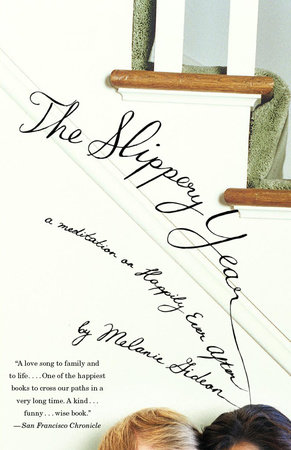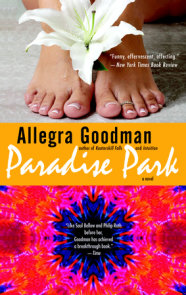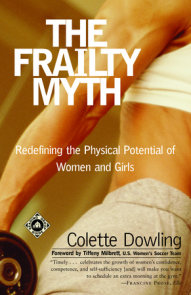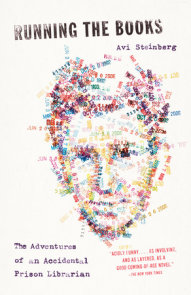READERS GUIDE
Melanie Gideon “has written a love song to her family and to life. What a lovely song it is. . . . It is a kind book, a loving book, a funny book, often a wise book. Its author is lucky; she is fortunate, blessed and has the saving grace to know it.” —San Francisco ChronicleThe questions, discussion topics, and reading list that follow are intended to enhance your reading group’s discussion of The Slippery Year, Melanie Gideon’s candid, charming, and piquant memoir of her forty-fourth year.
Introduction
“We are all so curious. Hungry for the truth. If only we could ask the questions we really want to ask of each other and get the real answers. Like how many times a month do you have sex? What prescription drugs are you on? Are you happy? Really happy? Happy enough?”For anybody who has ever wondered privately Is this all there is?, Melanie Gideon’s poignant, hilarious, exuberant meditation, The Slippery Year, chronicles a year in which she confronts both the fantasies of her receding youth and the realities of midlife with a husband, a child, and a dog (one of whom runs away). She reflects on the exigencies of domesticity—the need for a household catastrophe plan, the fainting spell occasioned by the departure of her nine-year-old son for camp, the mattress wars, and the carpool line. With tenderness, unsparing honesty, and uproarious wit, Gideon brings us back again and again to the sweetness of ordinary pleasures and to life’s most enduring satisfactions. She captures perfectly that moment right before everything changes when the things we have loved forever begin to fall away.
The Slippery Year is the story of a woman’s quest to reignite passion, beauty, and mystery and discover if “happily ever after” is a possibility after all.
Questions and Topics for Discussion
1. What does the phrase “The Slippery Year” mean to you? To the author?
2. Reread the T. S. Eliot quote on page ix. Why do you think Gideon chose this particular quote? What does it signify?
3. In an interview with The New York Times, Gideon said, “In writing about nothing, I was writing about everything.” What did she mean by that?
4. How does Gideon use humor in the book? How does it shape your opinion of her?
5. Why is Gideon so reluctant to spend time in her husband’s van? Is there something more to it than comfort?
6. On page 30, Gideon writes, “There comes a time in every mother’s life when it becomes very clear that your child is a much better person than you are.” Have you ever had a moment like that?
7. Several times in the book, Gideon talks about her faulty memory. Why do you imagine she has such trouble remembering things, especially good things?
8. On page 45, Gideon writes, “I’ve come to realize a call to adventure really means a call to feel really bad about yourself and all your shortcomings.” Do you agree? How does this fear affect Gideon’s life? Does she overcome it?
9. Compare Gideon’s relationship with her mother to her relationship with Ben. How is she like her mother and how is she different?
10. Reread the passage on page 79 that describes her mother’s understanding of why she was born. How does Gideon herself feel about it? What is your take on it?
11. In what ways does being a twin shape Gideon’s life and attitude? How is her relationship with her twin different from her relationship with her other sisters?
12. What does Gideon learn from her friend Renée, in the chapter about Pee Wee lacrosse?
13. On page 127, Gideon says, “I long for community, yet I shy away from intimacy.” Why do you think she does this? By the end of the book, does she still feel the same way? In what ways has she changed?
14. How does the woman weeping in the car pool line affect Gideon? Why is the car pool line so important?
15. Given Gideon’s overall attitude of fear, why does she drive Ben on a long car trip when the ophthalmologist had told her not to get behind the wheel?
16. What does Gideon learn from having to live with a scratched cornea?
17. Reread and discuss the passage on pages 208-209 in which Gideon describes her notion of home as a choice.
18. Why don’t they bury Bodhi in Maine?
19. In the end does Gideon discover her happily ever after? Is there such a thing as happily ever after? How about happily ever now?






















